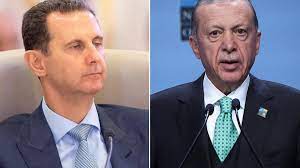In recent days, Iranian diplomacy has taken center stage, offering a potential breakthrough in Syrian-Turkish relations. Tehran unveiled a proposal that aims to address the concerns of both Syrian and Turkish parties by suggesting the withdrawal of Turkish occupation forces as a starting point for reconciliation, followed by the deployment of Syrian forces along the border to ensure Turkey’s security. This move not only aligns with Syria’s vision for reconciliation but also addresses Turkey’s apprehensions about withdrawal.
However, the mere presentation of this initiative by Tehran raises questions about its feasibility. This comes at a time when it appears that Turkish President Recep Tayyip Erdogan has shifted his focus away from Syrian-Turkish reconciliation, unlike his previous urgency before the presidential elections.
Iranian Foreign Minister Hossein Amir Abdollahian proposed an agreement in which Ankara commits to removing its forces from Syria in exchange for Damascus’ pledge to prevent any attacks on Turkish soil. The proposal also suggests Russia and Iran as guarantors of the agreement, emphasizing Tehran’s commitment to revitalizing this diplomatic path. It is worth noting that Iran’s move aims to assert its role as a sponsor of Turkish-Syrian dialogue, alongside Russia, amid concerns that the growing partnership between Russia and Turkey could sideline its influence in Syria, especially as Russia becomes increasingly preoccupied with its conflict in Ukraine.
This is not merely a contest between Iran and Russia in the Syrian arena; it is more about an integration of roles and a continuation of existing dynamics. Both Moscow and Tehran are key allies of Damascus, each with its unique presence in Syrian politics. Their common objective is to find a resolution in Syria that alleviates regional tensions and prevents the situation from escalating into a full-scale war. This is especially crucial given the risk of miscalculations by those opposed to Damascus, potentially leading to a point of no return. As long as the policy of economic pressure on the Syrian people persists, the need for a diplomatic solution remains paramount.
The complementarity of Iranian and Russian roles in the Syrian-Turkish reconciliation file is evident, despite minor differences in approach. Earlier this month, Russian Foreign Minister Sergei Lavrov suggested a return to the 1998 Adana Agreement, allowing Turkish forces to enter Syrian territory to counter terrorism threats, with Syria’s consent. This proposal aligns with Lavrov’s previous statements suggesting the validity of the Adana Agreement, a sentiment echoed as far back as 2019.
Iran’s efforts to facilitate Syrian-Turkish rapprochement dovetail with Russia’s policy objectives. Moscow has been working since December 2022 to normalize relations between Damascus and Ankara, facilitating meetings between President Bashar al-Assad and Turkish President Recep Tayyip Erdogan. These efforts have involved intelligence and defence discussions, followed by meetings between deputy foreign ministers, and ultimately culminating in a gathering of foreign ministers from Syria, Russia, Iran, and Turkey in May.
In politics, seizing available opportunities is a constant endeavour. Iran’s proposal comes in the wake of a prisoner exchange deal with the United States and the release of $6 billion in Iranian funds held in South Korea. Some speculate that this deal could serve multiple purposes, including influencing Iran’s stance in the nuclear negotiations and discouraging Tehran from supplying weapons to Moscow. Iran, in turn, may see this as an opportunity to play an active role in the Syrian-Turkish reconciliation process, ensuring that Washington does not pressure Ankara to reject the idea. Politics, driven by interests and pragmatism, embraces diverse ideas and proposals, even when they seem improbable. History reminds us that the pursuit of American interests often involves navigating contradictions, as exemplified by past withdrawals from Vietnam, Iran, and Afghanistan.
In the realm of geopolitics, where interests and strategies intersect, embracing unconventional solutions is not out of the realm of possibility. The world of politics thrives on such contradictions, shaping the course of events as it unfolds.
This article was translated and edited by The Syrian Observer. The Syrian Observer has not verified the content of this story. Responsibility for the information and views set out in this article lies entirely with the author.


